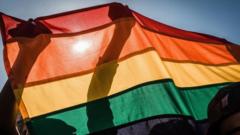The World Bank, as one of Uganda's major sources of external funding, has a significant influence on the country's infrastructure projects. Despite assurances from officials about new safeguards for LGBTQ rights, stories of violence and discrimination continue as the effects of the anti-gay law unfold within Uganda.
World Bank Reinstates Loans to Uganda Amid Controversial Anti-LGBTQ Law

World Bank Reinstates Loans to Uganda Amid Controversial Anti-LGBTQ Law
The World Bank has decided to lift its ban on loans to Uganda, imposed two years ago in response to the country's severe anti-LGBTQ legislation.
The decision by the World Bank to resume financial support for Uganda comes after the country's government enacted some of the most stringent anti-homosexual laws globally, including death penalties for specific same-sex acts. The legislation has led to widespread violence, discrimination, and evictions against the LGBTQ community, raising concerns from local watchdogs like Uganda's Human Rights Awareness and Promotion Forum. In response, the World Bank announced it has implemented "mitigation measures" designed to protect LGBTQ individuals while providing funding for essential projects like social protection and education. This strategic shift aims to ensure all citizens can benefit from development initiatives in the country while addressing past humanitarian issues linked to the legislation. Critics, however, argue that the funding models of international financial institutions often perpetuate dependency in poorer nations while neglecting underlying social issues. Recent years have seen a rise in anti-LGBTQ sentiment in several African countries, including Uganda, underscoring the complicated interplay of local values and international human rights advocacy.



















